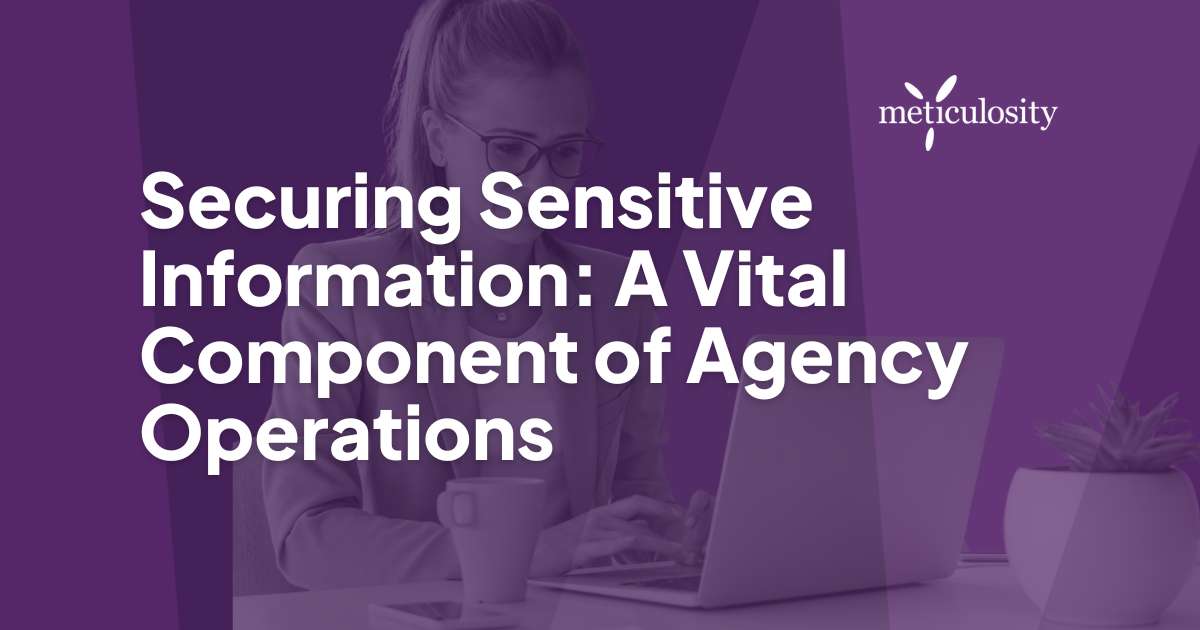Navigating the secure storage of client details and financial records can often feel like a delicate dance around a series of high-stakes traps. Wading through the complexities of data privacy is no small feat, especially considering that in 2021, cyber attacks cost companies an average of $4.24 million per incident – a staggering number, isn't it? Through our journey to understand how best to protect sensitive information, we’ve pieced together strategies that bolster your agency’s defense with surprising effectiveness.
Key Takeaways
- Sensitive information, including personal identifiers, financial data, and medical records, must be protected to prevent identity theft, financial losses, and damage to an agency's reputation.
- Compliance with laws and regulations is crucial for securing sensitive information and demonstrating a commitment to ethical business practices and client confidentiality.
- Cyber attacks, employee negligence, and human error are common security risks for sensitive information. Implementing robust cybersecurity measures and proactive strategies is essential in mitigating these risks.
- Prioritizing the security of sensitive information preserves client trust and agency reputation while ensuring compliance with legal obligations.
Understanding Sensitive Information
Sensitive information includes personal identifiers such as Social Security Numbers and Dates of Birth, financial information, and medical data.
Definition and types of sensitive information
Sensitive information is any data that must be protected from unauthorized access to safeguard the privacy or security of an individual or organization. This includes a range of details that could cause harm if exposed or misused.
Types of sensitive information cover personal identifiers like Social Security numbers and birthdates, which can unlock someone's identity in the wrong hands.
Financial data such as credit card numbers, bank account details, and investment info are also highly sensitive. They are keys to one’s financial health and must be guarded carefully.
Medical records, too, fall under this category – they contain private health histories that individuals have a right to keep confidential. Each piece of this information demands strong protection due to the serious risks associated with their exposure.
Financial information
Financial info is super important and needs to be kept safe. Consider everything like bank account numbers, credit card details, or even how much a person gets paid. If this stuff gets out, it can cause big problems.
Hackers and thieves always try to grab this data to steal money or ruin people's credit.
It's vital to protect financial information like it's treasure. You must use strong passwords and encryption and ensure only certain people can see it. Next, we must discuss another type of sensitive information that must stay private: medical information.
Medical information
Moving on from the financial information, addressing the protection of medical information within agency operations is crucial. Medical information includes details about an individual's health, treatment records, and other sensitive data related to their physical and mental well-being.
This type of information is highly personal and must be safeguarded against unauthorized access or disclosure to uphold both legal requirements and ethical standards in handling such private data.
Understanding the significance of securing medical information is pivotal for compliance and maintaining trust with clients and partners while upholding the integrity of agency operations.
Looking to empower your agency? Learn more here.
Impact of Compromised Sensitive Information
Compromised sensitive information can lead to identity theft, financial losses, and damage to reputation. Protect yourself and your agency by understanding the importance of securing sensitive information.
Identity theft and fraud
Identity theft and fraud pose significant risks when sensitive information is compromised. It can lead to financial losses, damage to reputation, and legal repercussions for agencies.
Marketers and business professionals need to understand that identity theft occurs when personal identifiers like social security numbers or dates of birth are unlawfully used. This can result in fraudulent activities such as unauthorized purchases or the opening of false accounts.
Therefore, it is crucial to implement robust security measures to safeguard against these threats, including encryption, access controls, employee training on data protection, and regular security audits.
Agencies need to be proactive in securing sensitive information by regularly updating security protocols and restricting access to data. Moreover, implementing strong password protocols and multi-factor authentication is essential in preventing unauthorized access.
Financial losses
Identity theft and fraud can lead to significant financial losses for individuals and businesses. When sensitive financial information is compromised, it can result in unauthorized transactions, fraudulent activities, and monetary damages.
As marketers and business professionals, understanding the potential financial repercussions of failing to secure sensitive information is crucial. Implementing robust security measures such as encryption, access controls, regular audits, and employee training can help mitigate the risk of financial losses due to data breaches or unauthorized access.
Protecting personal identifiers, financial data, and confidential information is pivotal not only for compliance with laws but also for safeguarding the monetary assets of an organization.
Damage to reputation
Compromised sensitive information can harm an agency's reputation, causing clients to lose trust and potentially choose competitors. When sensitive data is breached, it leads to negative publicity and can be difficult to recover from in the eyes of both current and potential clients.
Protecting sensitive information is crucial for maintaining a positive brand image and fostering trust with customers.
The Importance of Securing Sensitive Information
Agencies must prioritize the security of sensitive information due to the legal and ethical obligations and the need to maintain client trust and protect their reputation.
Compliance with laws and regulations
Ensuring compliance with laws and regulations is critical to securing sensitive information. It involves abiding by legal requirements and industry standards to protect personal data, financial records, and other sensitive information from unauthorized access or use.
As business professionals, staying updated on the latest security policies and data protection laws such as GDPR or HIPAA is essential. Adhering to these regulations not only minimizes the risk of legal repercussions but also demonstrates a commitment to ethical business practices and safeguarding client confidentiality.
By integrating security policy implementation with compliance efforts, marketers can contribute to maintaining the integrity of operations by relevant government regulations.
Preserving client trust
To maintain trust with our clients, it's crucial to prioritize the security of their sensitive information. By implementing robust data encryption, access controls, and regular security audits, we demonstrate our commitment to safeguarding their personal and financial details.
Additionally, providing thorough employee training on handling sensitive information and using secure data storage solutions reinforces our dedication to preserving client trust. This proactive approach aligns with compliance requirements and instills confidence in our clients that their information is handled with the utmost care and protection.
Protecting agency reputation
Protecting the agency's reputation is crucial for maintaining trust with clients and stakeholders. Failing to secure sensitive information can result in a loss of confidence, potentially damaging the agency's credibility and standing within the industry.
A strong focus on securing sensitive information demonstrates our commitment to upholding high standards of professionalism and reliability, safeguarding our reputation as a trustworthy entity.
Moving forward, let's delve into common security risks for sensitive information to understand potential vulnerabilities that require proactive measures to mitigate.
Common Security Risks for Sensitive Information
Cyber attacks, employee negligence, and human error are common security risks that can compromise sensitive information within an agency.
Cyber attacks
Cyber attacks can jeopardize sensitive information by exploiting vulnerabilities in systems and networks. It is essential to stay vigilant against these threats, which can include malware, phishing attempts, and ransomware.
Implementing robust cybersecurity measures like firewalls, intrusion detection systems, and regular security updates can help thwart potential cyber-attacks. Additionally, conducting employee training on recognizing and responding to suspicious activities online plays a critical role in fortifying defenses against cyber threats.
To safeguard sensitive information from the damaging consequences of cyber attacks, it is crucial to prioritize proactive cybersecurity strategies that encompass encryption, secure data storage solutions, and multi-factor authentication.
Employee negligence
After addressing the risks associated with cyber attacks, it’s crucial to acknowledge the potential threat posed by employee negligence. Despite advanced security measures, employees can inadvertently compromise sensitive information through actions such as improper handling of data, sharing login credentials, or falling victim to social engineering tactics.
This is why comprehensive employee training on data security protocols and best practices is vital in minimizing the risk of internal breaches and maintaining the integrity of sensitive information within agency operations.
It's imperative to recognize that while robust technological solutions are essential for protecting sensitive information, instilling a culture of accountability and awareness among employees is equally indispensable.
Human error
Human error is a significant risk when it comes to securing sensitive information. Simple mistakes like leaving a computer unlocked or sending an email to the wrong recipient can lead to data breaches.
Employees must undergo regular training on handling sensitive information, and for agencies to implement strict access controls and authentication measures, reducing the likelihood of human error compromising valuable data.
By prioritizing ongoing education and implementing stringent security protocols, businesses can minimize the impact of human error on sensitive information protection.

Strategies for Effectively Securing Sensitive Information
Implementing encryption and access controls, conducting regular security audits, providing ongoing employee training, utilizing secure data storage solutions, and implementing multi-factor authentication are essential strategies for effectively securing sensitive information.
Encryption and access controls
When securing sensitive information, encryption and access controls play a crucial role in preventing unauthorized access. Encryption helps to scramble data into a format that can only be read with the correct decryption key, adding an extra layer of protection against cyber threats.
Access controls ensure that only authorized personnel have the necessary permissions to view or modify sensitive information within the organization's systems. By implementing robust encryption methods and strict access controls, businesses can safeguard their sensitive data from falling into the wrong hands and maintain client trust.
Moving forward to "Regular security audits," let's delve into how routine evaluations help identify vulnerabilities and fortify security measures for protecting sensitive information.
Regular security audits
Regular security audits are crucial in maintaining the integrity of sensitive information within an agency's operations. These audits help identify vulnerabilities and gaps in security, allowing for timely adjustments to prevent potential breaches.
Regularly conducting these audits ensures that our data protection strategies are up-to-date and effective, providing peace of mind to our clients and our team.
By analyzing the outcomes of regular security audits, we can continuously improve our information security protocols and stay one step ahead of emerging threats. This proactive approach safeguards sensitive information and demonstrates a commitment to excellence in operations security, ultimately enhancing trust with our clients and partners.
Employee training
When discussing securing sensitive information, employee training plays a crucial role. It's essential to provide comprehensive and ongoing training to all employees on the importance of handling sensitive information securely.
This includes educating them on recognizing potential security threats, properly using encryption and access controls, and adhering to secure data storage protocols.
By continuously investing in employee training, agencies can greatly reduce the risk of human error or negligence that could compromise sensitive information.
Empowering employees with the knowledge and skills needed to safeguard sensitive data effectively is fundamental to maintaining a strong defense against potential security breaches.
Secure data storage solutions
When securing sensitive information, utilizing secure data storage solutions is crucial for protecting valuable data from unauthorized access. Secure data storage solutions involve encryption, access controls, and regular security audits to protect the stored information against potential cyber threats.
Implementing multi-factor authentication adds an extra layer of security, making it more difficult for unauthorized individuals to access sensitive data. By employing these strategies, businesses can maintain the confidentiality and integrity of their stored information while adhering to regulatory requirements.
Moving on to "Multi-factor authentication," let's explore how this additional layer of security further safeguards sensitive information.
Multi-factor authentication
When securing sensitive information, multi-factor authentication is crucial in enhancing the overall security posture. It adds an extra layer of protection by requiring users to provide multiple forms of identification before granting access.
This could involve something they know (like a password), something they have (like a code sent to their phone), or something about them (like their fingerprint). By implementing multi-factor authentication, agencies can significantly reduce the risk of unauthorized access and data breaches, ensuring that only authorized personnel can access sensitive information.
As part of effective risk management and secure communication practices, multi-factor authentication is essential in government operations and record maintenance for protecting personal information.
Prevention Measures for Securing Sensitive Information
Implement a proactive approach to security by regularly updating and patching systems, restricting access to sensitive data, and enforcing strong password protocols.
Proactive approach to security
To ensure the protection of sensitive information, a proactive approach to security is crucial. This involves anticipating potential risks and taking preventive measures before security breaches occur.
By avoiding potential threats, businesses can better safeguard personal information and mitigate the impact of attempted breaches. Implementing regular security audits, staying updated with the latest security patches, and monitoring systems for suspicious activities are essential to a proactive security strategy.
Furthermore, restricting access to sensitive data based on job roles and implementing multi-factor authentication can significantly reduce the risk of unauthorized access. Encouraging employees to report any unusual activities or potential security vulnerabilities adds an extra layer of vigilance in protecting sensitive information from cyber threats.
Regular updates and patches
In addition to maintaining a proactive approach to security, regular updates and patches are crucial for securing sensitive information. This involves consistently installing the latest software updates and security patches to address vulnerabilities and strengthen defenses against potential cyber threats.
By regularly updating systems and applying patches, we can mitigate the risk of exploitation by malicious actors seeking unauthorized access to sensitive data.
Restricted access to data
When securing sensitive information, restricting access to data is crucial. Businesses can significantly reduce the risk of unauthorized exposure by implementing strict controls over who can view, edit, or share sensitive information.
This can be achieved through user authentication processes such as multi-factor authentication and role-based access control systems that limit individuals' access based on their specific job responsibilities.
Additionally, encryption techniques should be utilized to protect data at rest and in transit, ensuring that even if unauthorized users access the system, the data remains indecipherable without proper authorization.
Strong password protocols
When it comes to securing sensitive information, strong password protocols are crucial. As a marketer or business professional, using unique and complex passwords for all accounts is essential.
Avoid common words and include a mix of uppercase letters, lowercase letters, numbers, and special characters in your passwords. Additionally, consider implementing multi-factor authentication for an extra layer of security.
Regularly updating passwords and avoiding reusing them across different accounts can significantly reduce the risk of unauthorized access.
Best Practices for Securing Sensitive Information
Regular data backups, secure data disposal, and ongoing monitoring for potential threats are essential best practices for securing sensitive information.
Regular data backups
Back up sensitive information regularly to ensure its safety. This practice helps prevent data loss due to system failures, cyber-attacks, or human errors. By conducting regular backups, you can quickly restore any compromised or lost data, safeguarding the agency's operations and maintaining client trust.
Maintaining a proactive approach to security is crucial for protecting sensitive information. Regularly backing up data minimizes the impact of potential breaches and ensures that critical information remains secure.
It is essential for preserving the integrity and continuity of agency operations while adhering to best practices for securing sensitive information.
Secure data disposal
Regular data backups are essential, and so is secure data disposal. Once the sensitive information becomes outdated or is no longer needed, it's crucial to dispose of it properly. This involves securely deleting electronic files and shredding physical documents to ensure the information cannot be retrieved or reconstructed.
Implementing consistent practices for secure data disposal helps mitigate the risk of unauthorized access or misuse, ultimately safeguarding your agency's reputation and maintaining trust with clients.
By following best practices for secure data disposal, such as using reliable shredding services or specialized software for digital file deletion, you can uphold the integrity of your agency's sensitive information handling processes.
Ongoing monitoring for potential threats
After securely disposing of sensitive data, continuously monitoring for potential threats is crucial. This involves regularly reviewing access logs and system activities, implementing intrusion detection systems, and staying updated on emerging cyber threats.
By proactively identifying and addressing suspicious activities or vulnerabilities, businesses can safeguard their sensitive information from unauthorized access or malicious attacks.
In addition to monitoring for potential threats, it's also essential to conduct regular security audits and vulnerability assessments to ensure that protective measures are adequate against evolving risks.

Conclusion
In conclusion, securing sensitive information is crucial for agencies. It protects against identity theft and maintains client trust. Implementing effective strategies and prevention measures is vital to safeguard sensitive data.
It's a proactive approach that preserves the agency's reputation and ensures compliance with laws and regulations.
Click here to learn more about agency marketing.
FAQs
1. Why is securing sensitive information crucial for the smooth operation of marketing agencies?
-
- Client Trust: Securing sensitive information is paramount for building and maintaining client trust. Clients expect their confidential data to be handled with the utmost care and protection.
- Operational Continuity: Information security is essential for ensuring uninterrupted agency operations and preventing disruptions caused by data breaches or unauthorized access.
- Legal Compliance: Adhering to information security best practices helps agencies comply with data protection regulations, avoiding legal consequences.
2. What specific measures can marketing agencies implement to secure sensitive information effectively?
- Effective Information Security Measures:
- Access Controls: Implement strict access controls, limiting access to sensitive information only to authorized personnel based on their roles and responsibilities.
- Encryption Techniques: Use encryption for sensitive data in transit and at rest to protect information from unauthorized access.
- Regular Audits: Conduct routine security audits to identify vulnerabilities and weaknesses in information systems, addressing them proactively.
- Employee Training: Provide comprehensive training for employees on information security protocols, emphasizing the importance of safeguarding sensitive data.
3. How does securing sensitive information align with client confidentiality, and how can agencies maintain a balance?
-
- White-Label Services: Utilize white-label services for sensitive tasks, allowing agencies to maintain client confidentiality while outsourcing certain functions.
- Confidentiality Agreements: Establish clear confidentiality agreements with employees and external service providers, emphasizing the importance of client data protection.
- Secure Communication: Implement secure communication channels and collaboration tools to keep client discussions and data exchanges confidential.
4. In the event of a security incident, how should marketing agencies respond to mitigate the impact on sensitive information and client relationships?
-
- Incident Response Team: Activate an incident response team to assess the situation, contain the incident, and initiate recovery processes.
- Client Communication: Notify affected clients promptly and transparently, providing details on the nature of the incident, steps being taken to resolve it, and measures to protect their sensitive information.
- Legal Compliance: Ensure compliance with data breach notification laws and regulations, reporting the incident to relevant authorities as required.
- Post-Incident Evaluation: Conduct a thorough post-incident evaluation to identify vulnerabilities, enhance security protocols, and prevent similar incidents in the future.
Securing sensitive information is a fundamental responsibility and a critical aspect of maintaining operational integrity, client trust, and legal compliance for marketing agencies.







